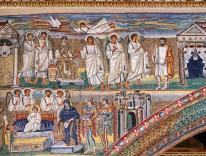I have taught ethics in the religion departments of several very different colleges and universities for quite a few years, and there are moments when I wish that I had instead specialized in something quite different—perhaps texts and artifacts that come from the world of the ancient Near East. Had I done that, when I walked into the classroom day after day the students would know that I was the expert and they were not. They would almost surely lack the skills that would entitle them to an opinion about how an ancient Akkadian text ought to be translated. It's unlikely that they would be able to identify archaeological artifacts or say much about the kind of civilization in which such artifacts would have been found.
But decades ago the die was cast, and I have been teaching ethics. Now, to be sure, in certain ways I have some expertise that students recognize. But that expertise does little more than help all of us get clear on what we're thinking about. When we take the next step and ask what we ought to think about what we're thinking about, the students do not recognize me as an expert, and they should not. Nor am I their father, to whom they might have obligations of obedience. Nor am I any elected representative of theirs, authorized to make decisions on their behalf. We're all just human beings—doing our best to think about what being human means and what it requires of us. And my own view is that the kind of bioethics most helpful to our public life is rather like that. Not everyone agrees. On June 10 President Obama notified members of the President's Council on Bioethics by letter that their work on the council would end on June 11. It was an abrupt but not altogether unexpected conclusion to the work of the Council, on which I served for seven years. More interesting, and more worth pondering, was the reason given by a White House press officer—at least as reported by Nicholas Wade in a June 17 New York Times article. “The Council was disbanded because it was designed by the Bush administration to be ‘a philosophically leaning advisory group' that favored discussion over developing a shared consensus.” By contrast, President Obama intends, Wade reported, to appoint a new bioethics body whose mandate will call for “practical policy options.”
I am not certain what is meant by a “philosophically leaning advisory group,” but it is true that the executive order establishing the President's Council on Bioethics had specifically relieved it of any obligation to seek consensus. One positive result of such a structure is that it frees a commission to be intellectually diverse, to have among its members a wide range of views on controversial issues—and that the President's Council surely had, far more so than any of its predecessor bodies. By contrast, taking as one's primary aim a search for “practical policy options” almost always leads to lowest-common-denominator proposals, from which the deepest and most important issues have been filtered out.
Here I have neither the intention nor the need to defend the work of the President's Council. It will, I think, stand the test of time reasonably well. But it is worth reflecting on the usefulness of the kind of bioethical reflection—“philosophically leaning” or not—that the Council tried to do; for, in my view, it is the approach to bioethics that best serves a pluralistic political community such as ours.
There is a certain tendency to think that bioethics has become politically engaged only in recent years—perhaps as a product of the so-called culture wars. I doubt that is the right way to describe what has happened, though there is no doubt that the formation of a series of national bioethics commissions—beginning in the mid-1970s--has given bioethics a role not just in the hospital or the academy but also in the public square. This is probably unavoidable, and I therefore see little reason to bemoan it. The important question becomes how best to structure the work of such public bodies. In order to address this question, we have to begin by thinking about the sense in which bioethics is, and should be, political. We can approach this point from three related but slightly different angles.
First, many of the most significant issues in bioethics force us to reflect on the meaning of our humanity—to think about our place in the universe; about the meaning of suffering; about the relation between freedom and the limits of our embodied existence; about whether there are goods that, for one reason or another, ought not be pursued; about the degree of altruism we can or should expect from human beings; about the meaning of human dignity; about the sense in which death is or is not an evil. These are not, in the most fundamental sense, technical questions on which only experts may comment. They are questions about who we are, where we are going, and what sort of people we want to be. And because they deal with the meaning of a genuinely human life, they are topics about which there will always be more than one view. So they are, among other things, political matters. They are the very stuff of democratic political discourse. We should not want it any other way.
Second, to press the point a bit further, some of the most disputed issues in bioethics inevitably engage what is perhaps the most fundamental political question there is: Whose good counts in the common good? So, for example, our centuries-long attempt to recognize and honor human equality has been at the heart of arguments about one of the issues people have had in mind in recent years when they take up the relation of bioethics and politics—namely, arguments about how we ought to treat human embryos. I myself think it is hard to deny that a human life begins at fertilization, as each of ours did. But, of course, that is a human being with almost none of its capacities yet present in the developed form we tend to value most. And it is a human being who may be quite useful and usable for other purposes of ours. Bioethics is caught within the tension or competition between our eagerness to take advantage of that usefulness and our commitment, laboriously developed over centuries, to human equality. What we do with such a question, what we decide about whose good counts in the common good, will always be a political matter, unless we simply cease to value self-government. We should want it to be a political matter—not one for bioethicists alone to decide.
Third, if in these ways bioethics is inevitably political, then we should not be eager to exclude from democratic debate kinds of argument and appeals to ideas that we find unattractive or unpersuasive. There is a certain anxiety manifest in claims that public discourse must be readily “accessible” to all. It manifests a nervousness that tries to fix in advance acceptable modes of argument and suggests a quasi-religious hope for a politics from which conflict has been eliminated. But conflict is never eliminated from politics. And that's all right. The sorts of issues I have mentioned deal with what is good for human beings, and there will always be more than one way to think about such matters. That the world is in some ways contrary, or even unresponsive, to our wills keeps us, as Robert Merrihew Adams has put it, from regarding it as just “an extension of ourselves.” Bioethics will be most useful when it helps us think about some of the deepest fault lines in our moral experience—fault lines that are, among other things, political in character.
This brings me back, at last, to the matter of public bioethics commissions. They have sometimes focused more on narrowing the range of public debate than on helping to cultivate deep and wide-ranging debate (out of which policy decisions could then be made not by bioethicists but by elected representatives). That narrowing is unfortunate. It will be better for our polity if public bioethics commissions have a structure not unlike that of the President's Council on Bioethics—a broadly interdisciplinary group of humanists, scientists, clinicians, lawyers, and historians, assembled to think from their various perspectives about the meaning of our humanity. That will produce the most politically useful bioethics—a bioethics that will enrich, and not fear, democratic governance.
Continuing the Conversation: Cathleen Kaveny, Moving Beyond the Culture Wars
Related: A profile of Gilbert Meilaender by Paul Lauritzen

